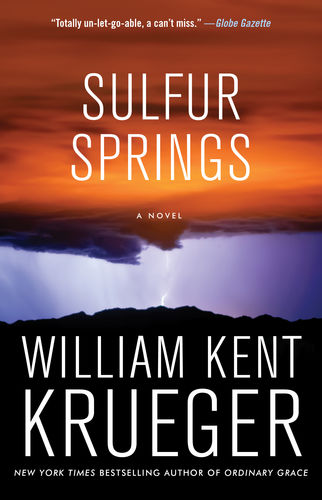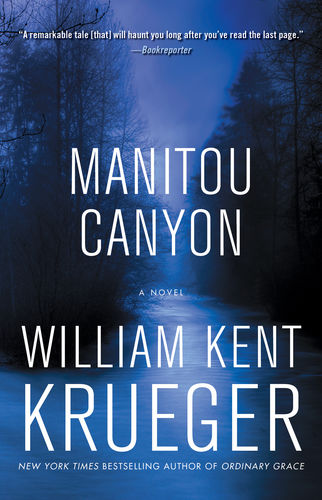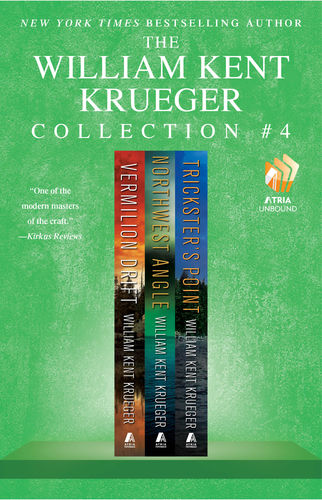This Tender Land (54 page)
Authors: William Kent Krueger

5. After having escaped Jack, the vagabonds encounter a Native American man named Forrest. He appears friendly and shares a meal with them, but he’s also aware that there is a $500 reward for their capture—a huge amount of money at the time. The children are unsure whether to trust him or not. What would you do in their situation?
6. Tent revivals—places where Christians would gather to hear religious leaders speak—were common in the Great Depression, often traveling across the country from town to town. They offered hope to people in desperate times, as Sister Eve does to Odie, Albert, Emmy, and Mose. However, Albert is skeptical of Sister Eve’s healings, calling her a con. What do you believe about Sister Eve’s ability to heal? What is the con that Albert is warning Odie about?
7. Why does Odie trust Sister Eve so wholeheartedly, but not her partner, Sid? Do you think he’s right to draw the conclusions he does about Sid from their interactions? How do some of Odie’s misjudgments lead to disastrous consequences? In your opinion, is what happens to Albert in some way Odie’s fault?
8. When the vagabonds encounter the skeleton of a Native American boy, Albert says there’s nothing they can do, but Mose reacts very differently. Later, he wanders off from the group to learn about the Dakota Conflict of 1862, which resulted in the execution of thirty-eight Sioux and the deaths of hundreds more. How does knowledge of this history change how Mose perceives himself? What impact does hearing this story have on Odie? On you?
9. Hoovervilles (named for President Herbert Hoover) were shantytowns that sprang up all across America during the Great Depression for homeless individuals and families. In difficult times like this, how do people like the Schofields survive? Is there an expectation that the government will help them, or do they look to other sources for assistance? How do the residents of this particular Hooverville pull together? How are they driven apart?
10. The Flats is like no other place the vagabonds have been on their journey. What makes it so unusual? When John Kelly is stopped by a policeman, why does he feel he has to say he is from a different part of town? Despite making a new friend, why is Odie so unhappy during the time he spends there?
11. When Odie is on his own, riding the rails, trying to get to St. Louis, he comes face to face with danger and violence. Do you think he was foolish for striking out alone? How was this encounter different from the things he experienced at Lincoln School?
12. Odie is a born storyteller even at his young age. Throughout the book he tells Albert, Emmy, and Mose tales about an imp, a princess, and the vagabonds. What purpose do these stories serve in the novel?
13. Sister Eve says to Odie that the only prayer she knows will absolutely be answered is a prayer for forgiveness. What do you think she means by this? Who are the people whom Odie needs to forgive, and for what reasons?
14. Odie, Albert, Mose, and Emmy are all searching for peace and a place to call home. What do you think each character is looking for and what are their different definitions of home? In the end, do they all find what they are looking for, and if so how?
15. The author has said that he drew inspiration from the works of Mark Twain, Charles Dickens, and Homer. Do you find elements of works by those authors in
This Tender Land
? Why or why not? Are there other authors whose work this story calls to mind?
16. In the story, Odie speaks of the journey he and the other are on as an odyssey. Do you see echoes of Homer’s epic poem in the children’s experiences? If so, can you identify Homer’s poetic counterpart for each section of the story?
1. For your next book club gathering, plan to meet somewhere outdoors and go on an adventure whether by foot or canoe. Discuss with your group what you notice about the landscape around you. How is the Midwestern landscape a part of Odie’s story and what connections to
This Tender Land
can you make to your own life and the place that you live?
2. Download the
This Tender Land
Spotify playlist and listen to some of the songs with your group. Discuss your favorite scenes in the book that feature music and how it changes your reading experience to hear the songs alongside them. Do you think the songs enhance the story? How?
3. Similar books about coming of age over one season like
The Body
by Stephen King and
This Boy’s Life
by Tobias Wolff have been adapted to the big screen. (The film based on
The Body
was titled
Stand by Me.
) If
This Tender Land
were turned into a film, which actors would you want to play the main characters (Odie, Sister Eve, Mrs. Brickman, et al.)? What scenes from the book would you most like to see on the big screen?

WILLIAM KENT KRUEGER
is the author of
Ordinary Grace,
winner of the Edgar Award for best novel. He is also the author of the bestselling Cork O’Connor mystery series, set in the North Woods of Minnesota. He lives in St. Paul. Learn more at
WilliamKentKrueger.com
.






 facebook.com/WilliamKentKrueger
facebook.com/WilliamKentKrueger @WmKentKrueger
@WmKentKrueger